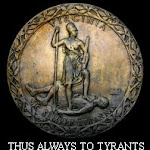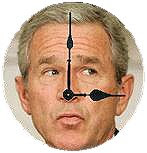






On March 17 2007, tens of thousands of people will join together to March on the Pentagon.
The country's largest Impeachment group, ImpeachBush.org/VoteToImpeach which has more than 850,000 signers and was founded by Ramsey Clark in January 2003, has announced that it is joining with the anti-war movement and mobilizing for the demonstration.
This past Saturday at a significant impeachment strategy session in New York City, other major impeachment and peace groups also decided to make the Saturday March 17, March on the Pentagon a primary focus of a new phase of impeachment initiatives that they will be supporting.
The March on the Pentagon is initiated by the A.N.S.W.E.R. Coalition (Act Now to Stop War & End Racism) which has organized the largest anti-war demonstrations in Washington D.C. and around the country since the start of Bush's endless "war on terrorism."
The March 17 demonstration is receiving widespread support from active-duty soldiers, veterans and family members who will be leading the march.
An unprecedented student and youth mobilization is underway on campuses.
An unprecedented student and youth mobilization is underway on campuses.
The Muslim and Arab community is organizing around the country.
There are already more than 150 cities that are organizing transportation to Washington and more than 40 states. More information is available at MarchOnPentagon.org."Impeachment of government officials for criminal acts and betrayal of the public trust is not a politically partisan matter.
There are already more than 150 cities that are organizing transportation to Washington and more than 40 states. More information is available at MarchOnPentagon.org."Impeachment of government officials for criminal acts and betrayal of the public trust is not a politically partisan matter.
The war in Iraq was based on the administration lying to Congress and to the people. It is a war of aggression," said constitutional rights lawyer Mara Verheyden-Hilliard, "The message of impeachment is spreading throughout the United States. Although no member of Congress has introduced articles of impeachment it is becoming an increasingly popular demand at the grassroots."
March on the Pentagon Saturday, March 17
JOIN WORLD CAN’T WAIT - DRIVE OUT THE BUSH REGIME And a massive coalition of anti-war organizations to MARCH ON THE PENTAGON Saturday March 17 End the War NOW! Impeach Bush for War Crimes!
On March 17, to mark the 5th year of this immoral and unjust war and occupation of Iraq, JOIN FORCES and march on The Pentagon. Tell the Bush Regime to End the War NOW! No attack on Iran!
George Bush and Dick Cheney must be impeached for war crimes and crimes against humanity! Millions are against the war, spying, torture, the abandoning of Katrina survivors, a spreading theocracy and suppression of science—and want the whole disaster of the Bush regime to be brought to a halt. The more we demand impeachment, Bush’s war options will grow more limited; the more his war crimes are exposed, the greater the impetus for his removal and repudiation.
The Call to Drive Out the Bush Regime says: “YOUR GOVERNMENT, ON THE BASIS OF OUTRAGEOUS LIES, IS WAGING A MURDEROUS AND UTTERLY ILLEGITIMATE WAR IN IRAQ, WITH OTHER COUNTRIES IN THEIR SIGHTS”
It is time we rise to this challenge in unity with each other. The people are on our side, the momentum is on our side, the whole world is on our side. The challenge: are we going to move heaven and earth to remove the criminal Bush regime, ending the war and repudiating the direction they’ve taken this society?
“THAT WHICH YOU WILL NOT RESIST AND MOBILIZE TO STOP, YOU WILL LEARN OR BE FORCED TO ACCEPT…”
Now is the time. 2008 is too late. It is unconscionable to allow this carnage to go on. We can and must reverse the entire course we have been forced to accept, or it will be made permanent.
March on the Pentagon and make our voices heard!
Saturday, MARCH 17. Assemble at the Vietnam Veterans Memorial (Constitution Gardens) at 12 noon in Washington, D.C. 2 pm March to the Pentagon.
worldcantwait.org or (866) 973 4463
1) Free Speech Victory! Pentagon March Route is Now Set2) Pro-impeachment organizations uniting for Pentagon March3) Speakers list for the March on Pentagon
*Please forward widely to friends, family, fellow students and e-mail lists*
PENTAGON MARCH ROUTE IS NOW SET
The Free Speech battle with the State of Virginia has been won! The attempt to obstruct the demonstration has collapsed. More than 2,000 people sent letters to the Virginia Attorney General and people everywhere expressed their outrage that Virginia would attempt to create barriers preventing demonstrators from marching to the Pentagon.
This could not have happened without everyone's participation. This combined political and legal challenge, waged with the assistance of the Partnership for Civil Justice, made all the difference. Legal and security issues have been dealt with to ensure a safe and secure march for the participation of the whole family. Click to see more logistical information for the March on the Pentagon.
Pro-Impeachment Organizations Uniting for the March on the Pentagon
At a meeting of a new coalition of a large number of organizations that are supporting impeachment, held in New York City on February 17, it was decided to mobilize for the March on the Pentagon on March 17 to demand, "End the War and Impeach Bush Now!" The coalition of organizations that have united in this effort is called Impeach07.
The members of Impeach07 are:
Pro-Impeachment Organizations Uniting for the March on the Pentagon
At a meeting of a new coalition of a large number of organizations that are supporting impeachment, held in New York City on February 17, it was decided to mobilize for the March on the Pentagon on March 17 to demand, "End the War and Impeach Bush Now!" The coalition of organizations that have united in this effort is called Impeach07.
The members of Impeach07 are:
- After Downing Street
- Backbone Campaign
- Center for Constitutional Rights
- Citizens Impeachment Commission
- CODE PINK Women for Peace
- Constitution Summer
- Consumers for Peace
- Democrats.com
- Democracy Rising
- Gold Star Families for Peace
- Green Party of the United States
- Green Party of the United States
- Hip Hop Caucus
- Impeach the President
- ImpeachBush.org
- Military Free Zone
- National Lawyers Guild
- Patriotic Response to Renegade Govt
- Progressive Democrats of America
- Independent Progressive Politics Network
- Velvet Revolution
- World Can't Wait-Drive Out the Bush Regime
The breadth of support for the March on the Pentagon is reflected in the 1500 endorsers, including national and local organizations, that are supporting and mobilizing to come to Washington, DC.
The breadth of support for the March on the Pentagon is reflected in the 1500 endorsers, including national and local organizations, that are supporting and mobilizing to come to Washington, DC.
The lead contingent of the demonstration will include thousands of Iraq war veterans, soldiers' families, and other veterans.
The March on the Pentagon speakers list includes:
- Malik Rahim, Founder of Common Ground Collective
- Cindy Sheehan, Gold Star Families for Peace
- Howard Zinn, Author, A People's History of the United States
- Ramsey Clark, Former U.S. Attorney General
- Melida and Carlos Arredondo, whose son and stepson was killed in Iraq
- Congressman John Lewis (Georgia)
- Mahdi Bray, Executive Director of Muslim American Society Freedom Foundation
- Mounzer Sleiman, TV commentator & Vice Chair, National Council of Arab American
- Leonard Weinglass, Civil Rights Attorney-
Mara Verheyden-Hilliard, National Lawyers Guild
- Jonathan W. Hutto Sr., Navy Petty Office Third Class, Co-Founder Appeal for Redress
- Liam Madden, Former Sgt. USMC, Appeal for Redress, Bellows Falls, VT
- Anita Dennis, Organizer with Courage to Resist, Military Families Speak Out member
- Helga P. Aguayo, Wife of Conscientious Objector Agustín Aguayo
- Debra Sweet, National Coordinator, World Can't Wait
- Brian Becker, National Coordinator, ANSWER Coalition
Student groups, religious organizations, many impeachment organizations, and others are actively building for this demonstration. Click to see the list of transportation centers.
If you are organizing transportation from your area for the demonstration and haven't contacted the national office to be listed as a transportation center, please do so right away.
We receive hundreds of calls every day from people seeking information on transportation from their area to Washington - be sure that you are listed so that they can travel with you! We also have organizing packets available with colorful flyers, stickers and posters that you can get by calling the National Office at 202-544-3389.






























![[PDA - Progressive Democrats of America - Stand Up. Take Action. Vote.]](http://pdamerica.org/images/ads/pdalink-150x200.gif)




